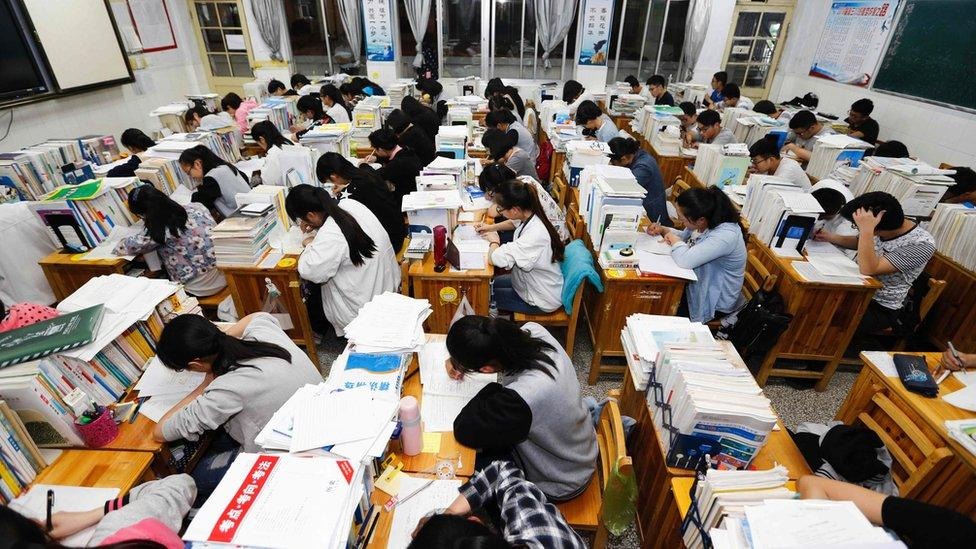Table of Contents
When AI Takes a Back Seat
Imagine if you were taking the biggest test of your life, and your calculator, dictionary, and smart assistant suddenly stopped working. That’s exactly what happened to students in China during a big national exam in June 2025.
Two of China’s largest tech companies, Alibaba and Tencent, decided to pause their AI tools for a few days. Why? To keep the exam fair and honest.
This story helps us understand how technology, education, and fairness are connected — and why sometimes, even smart AI needs to be turned off.
What Is the Gaokao Exam?

In China, there is a huge test called the Gaokao. It’s kind of like a super-important final exam for high school students. Your score decides if you can go to college, and which one.
It’s so important that many families prepare for it for years.
Because of how serious the Gaokao is, cheating is a big concern. In the past, some people have tried to cheat using:
- Earbuds
- Smartwatches
- Hidden cameras
- AI-powered apps
That’s why the government, schools, and even tech companies want to make sure it’s a fair test for everyone.
What Did Alibaba and Tencent Do?
To stop cheating during the Gaokao:
- Alibaba (creator of ChatGPT-style tools in China)
- Tencent (maker of WeChat and AI chat tools)
…both announced that they would pause or limit access to their AI tools for a few days during the exam.
This included chatbots, writing assistants, and search helpers that students could use to get quick answers or even full essays.
Their message was clear: “Let the students do the work on their own.”
Why Was This Necessary?
Some people might ask: “Why turn off all AI for everyone? Isn’t that unfair, too?”
Here’s the thing:
- Not every student has the same access to technology
- Some might use AI to cheat by getting help with math or writing
- AI can sometimes give answers that sound smart, even when they’re wrong
By freezing AI access during the exam, the companies helped:
✅ Create a level playing field
✅ Avoid distractions
✅ Support academic honesty
It’s kind of like turning off your phone before a test, just on a national level.
The Bigger Picture: Can AI and Education Work Together?
This event shows that AI is powerful, but it needs rules.
AI is changing how students learn. It helps them:
- Practice writing
- Solve tricky math
- Translate languages
- Get summaries of textbooks
But if used during an exam, it’s no longer learning — it’s just copying. That’s why smart tools need smart limits.
In the future, schools will need clear rules:
- When to use AI for homework
- When to NOT use AI (like during exams)
- How to teach students to think for themselves
What Other Countries Can Learn
Other countries are closely watching what is happening in China. Many are asking:
- Should we block AI during our exams, too?
- How do we detect AI-written homework?
- Can students use AI responsibly?
The answer isn’t easy. However, China’s big test reveals one thing for certain: technology in education must be used with caution.
What This Means for Big Tech Companies
Alibaba and Tencent made a tough choice. Turning off popular AI services — even for a few days — means:
- Losing users
- Slowing down business
- Taking public criticism
But they did it to support fairness. And that shows they’re taking responsibility as tech leaders.
Other companies might follow their lead, creating “quiet zones” for major events such as exams, elections, or job tests.
Conclusion: A Fair Test Is a Smart Test
In a world where technology is everywhere, sometimes the smartest move is to turn it off — just for a little while.
Alibaba and Tencent’s decision to pause AI tools during China’s national exam reminds us that fairness and honesty matter more than convenience.
For students, it’s a lesson in doing your best, without shortcuts.
For teachers and schools, it serves as a reminder to guide students in using technology wisely.
And for all of us, it’s a glimpse into the future, where AI and humans can work together, but not at the cost of integrity.